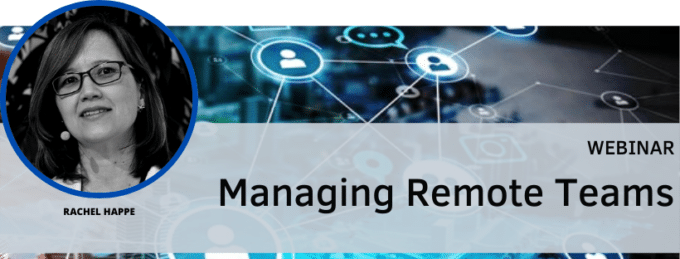The dramatic spread of COVID-19 is making people scramble. Colleges and Universities are transferring to virtual learning. Employers are shutting offices and encouraging people to work from home in industries where that is possible. Events and conferences are being canceled. People are starting to avoid large gatherings.
It is an anxiety-inducing time. Entire industries – events, food service, hospitality, entertainment – and the millions of people that work in them are struggling already. For those of us who work in the knowledge economy – we have it relatively easy; we CAN work remotely and for the most part, organizations have the technical infrastructure set up to support this and here are some great recommendations by Dion Hinchcliffe to ensure you are set up for it.
However, if you are a manager who works primarily in an office with your teams, there are real challenges to moving work online, especially as it relates to working together. Virtual work is particularly challenging because
- The cadence and routines of work change
- It is harder to communicate and understand nuance and emotion
- Addressing conflict requires more explicit intent and because of that escalates its impact and reaction in ways that are not helpful
- The small daily interactions that allow people to connect, support, and enjoy each other are more difficult.
- Online meetings can be harder to manage in a way that everyone gets heard and acknowledged.
- Some personality types really struggle with digital environments because they don’t get immediate emotional feedback
There are also some real benefits to working remotely, including:
- Less wasted time commuting that can help people feel less squeezed between home and work responsibilities.
- More flexibility to blend home and work responsibilities in ways that fit individual work styles and preferences.
- Higher ability to focus on work and production tasks.
- Communication needs to be explicit, which increases accountability and clarity.
- Some personality types that struggle to communicate in person assertively are more comfortable in digital environments, elevating their perspectives.
Most of us who are knowledge workers have some experience working remotely, although it’s worth exploring recommendations of those who do regularly. Things like creating a home office space, getting ready and dressed for work, and keeping to a daily structure can help tremendously.
For managers, however, there is another layer to consider because they are the ones typically tasked with creating a positive work culture, resolving conflicts, and ensuring their team members are productive and engaged. Online community managers have been addressing these issues for years and it’s worth leveraging what they know about building relationships, connecting people virtually, engaging people, and prompting productive behaviors.
Recommendations for Managing Virtual Teams and Communities
I have long said that the future of all management is community management and it looks like this crisis may make it so. My recommendations for those managers who are finding themselves to be newly online (community) managers:
- Think about your team’s weekly routines. How can you help create the prompts (community managers call this programming) that help provide critical touchpoints for people? This might be a Monday Work-Out-Loud or #ThreeFrogs post so everyone sees what’s going on with everyone else. It could be a virtual Happy Hour.
- Practice the Language of Engagement so that you are not inadvertently shutting down conversations and ensuring people feel comfortable sharing their perspectives online and transparently.
- Make sure you include fun ways to connect, which builds empathy and makes it easier to resolve conflict when it does happen. It could be a space for people to share what they are eating, ways they are investing in their wellness, pictures from vacation, or what their pets are doing.
- Design your workspace so that people can find what they need and are not overwhelmed. At The Community Roundtable we have channels for each major function and project/initiative as well as all team channels like #ProTip, #ShoutOuts, #Flip_That_Sh*t, #Wins, and #Noteworthy that provides intentional spaces to encourage the sharing of general information and constructive behaviors that are helpful but not specific.
Interested in Learning More?

Access the Managing Remote Teams webinar archive here.
Consider taking Internal Community Management Fundamentals course designed for those managing employee communities or subscribing to TheCR Library, both of which are also available for enterprise licenses.
What other resources have you found valuable? Please share in the comments!

 Rachel shared some thoughts earlier this week on the J. Boye blog. In a post entitled
Rachel shared some thoughts earlier this week on the J. Boye blog. In a post entitled 